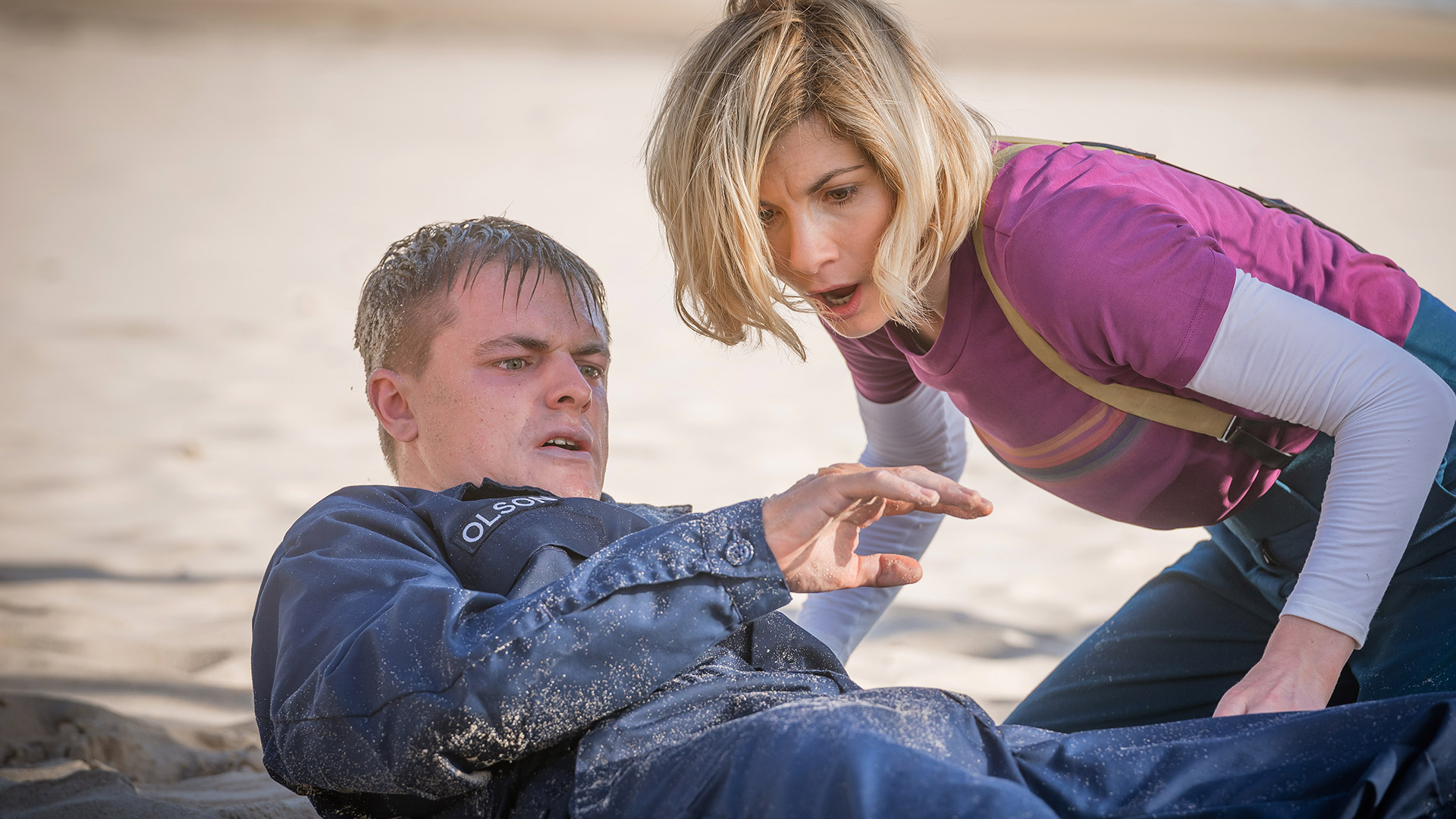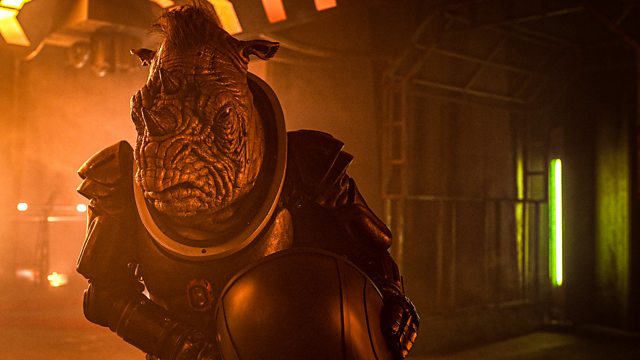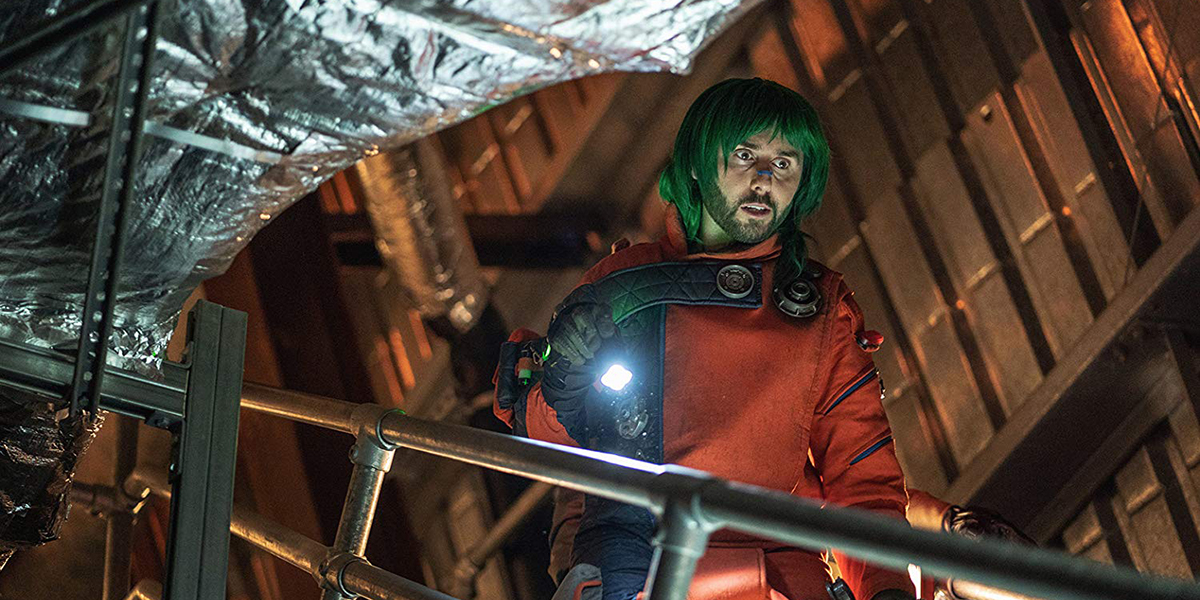There's a coherence of message in this episode that was sorely lacking in Orphan 55. Essentially, the moral of the story is the same, that pollution and climate change are causing untold damage to our planet and will eventually destroy us (cheery thought), but it's delivered with a great deal more elegance and subtlety in Praxeus. Or to put it another way, the Doctor doesn't need to turn around and say at the end, "Stop dumping plastic into the ocean, you bunch of dimwitted simpletons." (I feel like the Twelfth Doctor would have been fine saying this though). The episode itself is competently assembled, with some interesting individual moments, and zips along at a pretty reasonable pace. It's not great by any means, it's just kind of OK.
McTighe does a much better job of balancing all the regulators here than we've seen throughout most of this season. They each get something significant to do that advances the plot, even, and don't faint when you read this, Yaz. We'll talk a lot more about Yaz in the review of the next episode, but her relative importance in the most recent stories only goes to highlight how wasted the character has been. Mandip Gill brings a great deal of enthusiasm and charisma to the role and, if as looks likely from her growing independence, she's leaving at the end of the season, it will end up being such a waste of potential. She gets some good moments here, though, and I particularly enjoy her disappointment that she hasn't actually discovered an alien planet after all.
But as I say, the companions are all reasonably well served here, or at least as well as they can be within the constraints of the 50 minute episode format. The tried and tested trick of splitting them up and having each of them contribute something to solving the mystery is effectively utilised here, as well as I'm sure easing some of the pressures of production. Ryan gets to investigate and then dissect the birds and discover that they're full of plastic, which works well to actually sell the message the story is trying to convey because the whole thing is just incredibly icky. Yaz goes off on her own and discovers the alien construct. Even Graham, whose role this season has largely been comic relief, gets a few nice moments. The scene where Jake confesses his insecurities to Graham is lovely, and there's a lot of unspoken references to Grace in how Bradley Walsh plays it. Despite the rushed feeling of the story, there are at least a few moments for each companion to shine.
Although, I feel like it could have been even better for the regulars if we hadn't spent so much time globetrotting in this episode. Don't get me wrong. I like that this season has an international element to it. Early New Series Doctor Who was so fixated on London (and occasionally Cardiff for ease of filming reasons) whenever the TARDIS landed in Earth, it was easy to forget that there are other cities in the world. But there's no reason for any of this to be set in those places in particular. The only thing that distinguishes that some of the scenes are set in Hong Kong is that we get a big caption that says "HONG KONG". We don't get a sense of the culture, the history, or really anything to do with the location. It helps keep the story moving forward with some sense of momentum but it might as well have been anywhere. I feel like we could have cut one of the locations and some of the side characters and just slowed things down a touch.
This feels like a step backwards in terms of the Doctor's characterisation as well. Gone is the darkness and edge that Jodie Whittaker has weaved into her performance so far this season, and we're left with something much more closely resembling the Series 11 Doctor. She's there to basically dump exposition with a fixed zany grin on her face, and when you're talking about the world being poisoned by plastic, it feels very jarring. The script leans heavily on technobabble to explain what's happening, but the writers don't have the flair that Steven Moffat had for making exposition interesting and so the whole thing feels clumsy. A lot of the work falls to Jodie Whittaker to make those moments work and they just don't. Hopefully this is just a temporary setback and we'll be back to the more three dimensional characterisation as we approach the finale.
More positively, the gay representation in this episode is a massive improvement. So far in the Chibnall era, it's become a running joke that LGBT+ characters only turn up to be killed a moment later or to refer to their dead spouse. Burying your gays is one of the more unpleasant narrative devices in storytelling. Luckily Jake and Adam feel like fully rounded characters who actually get a happy ending. Shock horror. On the whole, it's very skillfully and sensitively done. Although I could have done without Jake's whole noble self-sacrifice thing as Jamie Mathieson kindly eviscerated that particular trope during the Capaldi era. Go and die to save a hairband, indeed. At least they don't actually kill him I suppose.
I'm left wondering what it is that justifies the co-writing credit from Chris Chibnall here. In the last episode, it was clear after the fact why the showrunner had had such heavily involvement in it. Here I'm not so sure. It feels like McTighe is a skilled enough writer that it might have benefited from less involvement from Chibnall. Either way, what we have is as solid and functional as Chibnall era Who gets. It works well enough, but I doubt I'll remember much about it in a few weeks.
Random musings
- There was a lot of speculation following this episode that Yaz was behaving strangely and that it might have something to do with the season arc. With the benefit of hindsight, we can say that this was categorically not followed up in the next episode. But then that's what happens when you don't bother to give one of your characters any characterisation for a season and a half, people end up leaping to conclusions because there's no consistency in their behaviour.
- The effects when people are consumed by Praxeus are very effective. Nasty but staying on the right side of gruesome for pre-watershed television.
- Poor Aramu. Not sure anyone even noticed you died.
- The jokes about vlogging feel like they were written by two 50 year old men. Which, of course, they were.
- "Can't get the breathing apparatus off to see the face." Why hello, The Empty Child.
Verdict
As a standalone episode of Doctor Who, Praxeus is solid if pretty unremarkable. But as a follow-up to the arc heavy and revelatory Fugitive of the Judoon, it can't help but feel a little disappointing.
Rating
6/10





